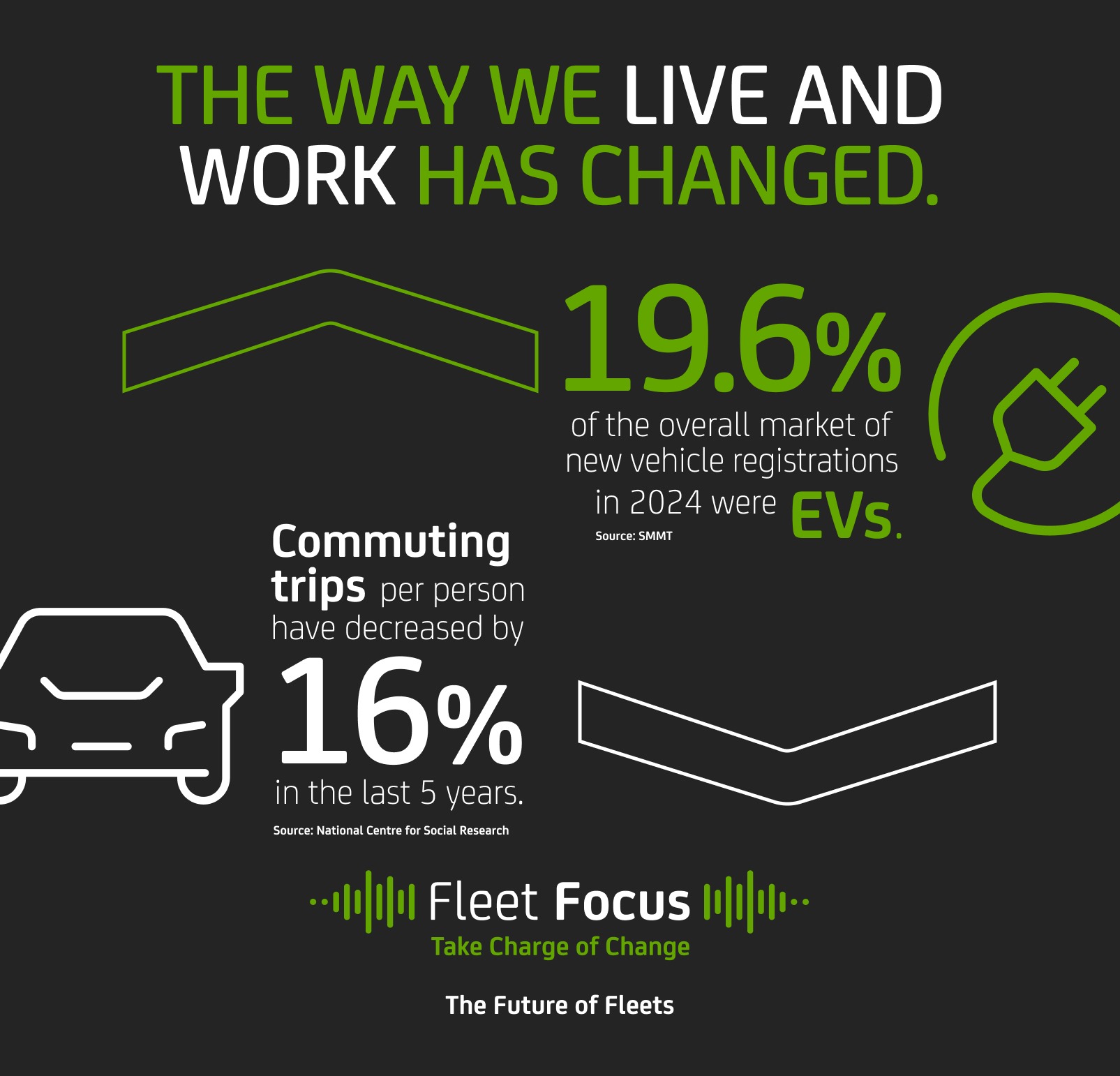Future of Fleets
Adapting your fleet strategy to meet changes in work and social patterns.
Fleet managers today face a host of challenges, as the way businesses operate continues to evolve.
Remote working, environmental targets, and the electrification of transport are reshaping fleet requirements for UK businesses.
As Andy Barrell, Head of Outsourced Relationships, Lex Autolease explains. “There’s been a massive shift away from that one size-fits-all approach to a variety of different solutions, depending on what your motability need is.”
This diversity of solutions not only meets employees' needs but also helps cut costs, boost satisfaction, and align operations with long-term goals.

Responding to remote and hybrid working
The rise of remote and hybrid working has redefined fleet usage patterns. Fewer employees are commuting daily, and those who do often travel shorter distances.
Commercial vehicle requirements have also shifted, with businesses now focusing on agility and efficiency to meet the demands of e-commerce and local deliveries.
For fleet managers, these changes call for flexible vehicle solutions. Pool cars, short-term leases, and part-time access options help adapt to the varying levels of travel employees now undertake.
For high-mileage drivers, traditional company cars may stay essential, while employees who rarely commute might benefit from car-sharing arrangements or unplanned vehicle access. Flexibility makes sure your fleet stays cost-efficient while meeting evolving employee needs.
ESG targets are changing the game
Environmental, Social, and Governance (ESG) targets are also heavily influencing fleet decisions. With the UK’s goal to achieve net-zero emissions by 20501 – and the ban on new petrol and diesel car sales coming in 2035 - fleet managers face growing pressure to reduce their environmental impact.2
Offering employees multiple vehicle options, including low-emission and electric models, is a powerful way to meet ESG commitments.
Providing access to electric vehicles (EVs) through salary sacrifice schemes, for example, not only shows your company’s green credentials but also makes EVs accessible to more employees.
These schemes allow employees to lease EVs at a reduced cost, thanks to savings on National Insurance and Income Tax, making sustainability both practical and affordable.
Multiple solutions to drive down costs
Cost management remains a priority for any business, and providing a range of vehicle solutions is an effective way to achieve savings.
Salary sacrifice schemes can reduce upfront capital investment while giving employees a valuable benefit.
For commercial fleets, pay-as-you-go leasing models allow businesses to scale their fleet up or down based on real-time demand, eliminating unnecessary costs during quieter periods.
For employees with less frequent travel requirements, allowances for personal vehicles - or access to flexible rental solutions - reduce the need for a permanent company car, making sure resources are allocated efficiently across the workforce.
The growing appeal of electric vehicles
Electric vehicles are becoming increasingly attractive for both employers and employees.
For businesses, EVs can deliver cost savings through reduced maintenance and lower fuel costs3, as well as supporting compliance with Clean Air Zones and emissions targets.
Employees benefit from quieter, smoother vehicles with significantly reduced running costs.4
Offering a variety of EV solutions, such as tailored leasing plans or salary sacrifice options, helps businesses stand out as forward-thinking, sustainable employers.
Partner with Lex Autolease
At Lex Autolease, we understand that no two businesses - or employees - are alike. That’s why we offer a range of tailored solutions to meet the diverse needs of your workforce. From traditional company cars to flexible leasing options and support for EV adoption, our expertise helps you build a fleet strategy that meets today’s challenges while preparing for the future.
By embracing multiple solutions, UK businesses can achieve greater cost control, improve employee satisfaction, and drive progress towards environmental goals. With the right approach, your fleet can be an asset that drives value and sustainability in equal measure.
- Net Zero Strategy: Build Back Greener, UK Department of Energy Security & Net Zero and UK Department for Business, Energy & Industrial Strategy.
- Phasing out sales of new petrol and diesel cars from 2030 and supporting the ZEV transition, UK Department of Transport.
- SMR and the running costs of EVs, Lex Autolease.
- Net Zero Strategy: Build Back Greener, UK Department of Energy Security and Net Zero and UK Department for Business, Energy & Industrial Strategy.
Infographic sources
- 19.6% of the overall market of new vehicle registrations in 2024 were EVs, SMMT UK New Car Registration Data - Latest Figures & Statistics.
- Commuting trips per person have decreased by 16% in the last 5 years, National Centre for Social Research - National travel survey.
Lex Autolease News
Read more news articles from Lex Autolease